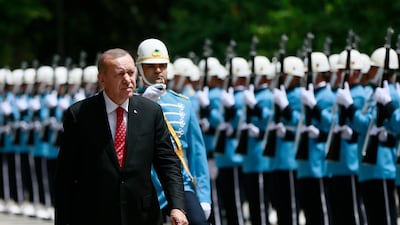The close relationship that once existed between the US and Turkey should now be consigned to the history books. The two countries are no longer strategic partners and it is unlikely that this will change in the foreseeable future. If anything, links could deteriorate even further.
Last week, the US expelled Turkey from the F-35 Joint Strike Fighter programme, a direct result of Turkey's receipt of the Russian S-400 missile defence system. The S-400 is incompatible with Nato hardware and was designed to shoot down US planes. In the coming days Turkey may also be slapped with sanctions based on the Countering America's Adversaries Through Sanctions Act (CAATSA).
Some might say that the reason for the decline in relations was the residency in the US of Fetullah Gulen, the Turkish cleric whom President Recep Tayyip Erdogan claims orchestrated the July 2016 attempted coup against him. Others might note that Turkey considered it a betrayal that Washington armed the People's Protection Units (YPG) in its fight against ISIS, given that Ankara views the Syrian Kurdish group pert of the separatist Kurdistan Workers party (PKK) which Turkey has been fighting since the 1980s.
Others will note that Washington is angry that Turkey leaked the location of US forces in Syria, turned a blind eye to militants passing through Turkey to join ISIS, imprisoned consular employees and US citizens and actively helped Iran subvert international sanctions.
However, these are just symptoms. The reason for the decline in relations is because in recent years the US and Turkey have had different strategic interests. The two countries are also not bound by either shared values or a significantly high volume of trade.
Turkey and the US were strategic partners during the Cold War, when they both considered the Soviet Union and communist agitation their primary threats. The alliance lasted well into the 2000s, when Washington considered Turkey an important ally in the War on Terror. However, now, there is no mutual threat to necessitate such a partnership.
If one were to name some of the US’s most significant strategic concerns, one would probably mention nuclear proliferation, especially the activities of Iran and North Korea; the spread of Chinese influence; Russian aggressiveness in Europe and beyond; the continued threat of terrorist groups such as ISIS and Al Qaeda; and instability in the Middle East and Latin America. One might also add global warming, cyber-security and uncertainties surrounding the future use of artificial intelligence.
However, China doesn't keep Turkey’s President Recep Tayyip Erdogan up at night. Neither does Russia or North Korea. Sometimes, intermittently, Ankara considers ISIS and Al Qaeda a threat, but on other occasions it looks the other way. In recent years, Turkey has seen Iran as less of a threat and more of a strategic and commercial partner. Global warming, artificial intelligence and cyber security are issues that are hardly discussed in Ankara on a serious policy level.
What concerns Mr Erdogan and his ruling clique is the PKK and the Gulen movement, followers of the exiled preacher. However, both are internal enemies, which pose no real danger to the US.
If anything, under the leadership of Mr Erdogan and his ruling Justice and Development Party, it is the US which Ankara considers a threat, if not an enemy, because of Washington's support for the YPG and the conspiratorial view that the US was behind 2016's attempted coup.
In this light, Ankara deems Russia a means to counter the US. Russia has also given Turkey a say on the future of Syria, supported it against the Gulen movement and does not stand in the way of Turkey’s quest to be a regional superpower.
Meanwhile, the Turkish model for democratic reform proved hollow after the brutal suppression of the 2013 Gezi Park protests. Any hope for meaningful change in Turkey was finally snuffed out in 2016. In the period after, hundreds of thousands of state employees, security services personnel and members of civil society were either dismissed or arrested. The following year, constitutional changes granted Mr Erdogan unassailable power. Sure, the US works with less than savoury regimes across the world, but only if their strategic interests overlap.
Although the value of US-Turkish trade stands at a respectable $20 billion, Turkey is only America’s 32ndlargest trading partner. Since 2015, the value of trade only slightly increased and, now, it looks set to stagnate. In March, Washington announced that it is ending the preferential trade agreement with Turkey. Now, excluded from the F-35 programme, faced with looming CAATSA sanctions and enduring a recession, Turkey’s future does not look bright.
Dr Simon Waldman is an Associate Fellow at the Henry Jackson Society and visiting research fellow at King’s College London

